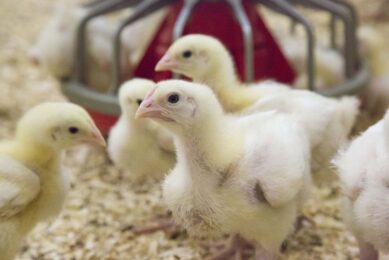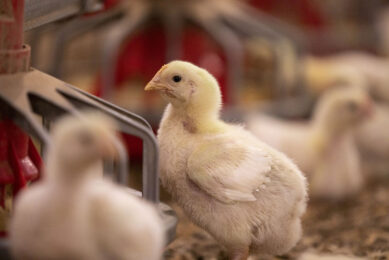A low dose of trace minerals can pack a punch

Trace minerals, which originate from the earth, ultimately account for a relatively small portion of an animal’s diet, but they represent a critical component in animal nutrition and metabolism.
Dietary trace mineral imbalances and deficiencies are commonly corrected by various levels of supplementation from inorganic or organic sources, depending on the animal’s minimum requirement and the trace mineral source bioavailability.
Trace mineral requirement and bioavailability depend on intrinsic factors and extrinsic factors:
Intrinsic factors (for example)
- species
- genetics
- age
- sex
- criterion of adequacy
- metabolic function
- nutritional status
- intestinal flora
- physiological stress
Extrinsic factors (for example)
- trace mineral element solubility
- binding to other dietary factors
- state of oxidation
- competitive antagonisms
- positive or negative chelation effects
Figure 1 – Broken-line analysis plot of weight gain in broilers as a function of supplemental zinc as Bioplex Zn with or without phytase (from Ao et al., 2007).

Trace minerals and poultry nutrition go way back
Trace mineral nutrition discovery and research has a rich history in poultry nutrition. Many of the early nutrient metabolism studies were conducted in chicks during the period between 1960 and 1980, and requirements were established for each poultry species. Based on this research conducted over 40-50 years ago, minimum dietary requirements were established for zinc, manganese, copper, iron, selenium and iodine, and the last official publication of these requirements for poultry was in “Nutrient Requirements of Poultry” (National Research Council, 1994), Table 1.
The genetic potential for growth in commercial poultry has changed dramatically during the last five decades, as has the nature and quality of the diet fed to these animals. This is why supplementation of these trace minerals (usually from inorganic sources) in commercial feeds often exceed the National Research Council (NRC) (1994) recommendations by 3- or 4-fold to compensate for variable bioavailability, yet resulting in public concern about excessive environmental emissions.
Trace mineral programmes today
Recent research on organic trace minerals has challenged this paradigm of high dietary inclusion of inorganic trace minerals. Due to their increased bioavailability, organic trace minerals have demonstrated opportunities for improved physiological/metabolic functions and reduced environmental emissions, justifying the establishment of new minimum nutritional requirement recommendations.
Dietary inclusion of organic trace minerals at levels as low as 12.5% of typical commercial levels have been shown to result in equal or superior growth performance and tibia ash, see Table 2. Along with phytase supplementation, which is typically used for most commercial poultry, growth performance can be maintained with organic trace minerals at levels well below the NRC recommendations. Future recommendations for dietary trace minerals will depend upon strategic applications in poultry nutrition that affect environmental sustainability, health and welfare, meat and egg quality, and epigenetic programming.
Author: Dr Peter R. Ferket, Prestage Department of Poultry Science, North Carolina State University
Join 31,000+ subscribers
Subscribe to our newsletter to stay updated about all the need-to-know content in the poultry sector, three times a week. Beheer
Beheer





 WP Admin
WP Admin  Bewerk bericht
Bewerk bericht